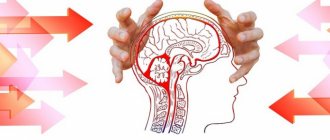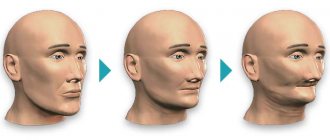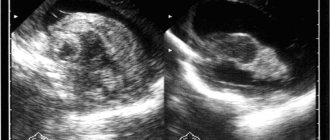Idiocy is the most severe form of mental retardation (previously in psychiatry the term “oligophrenia” was used to describe this pathology). This disease is caused by a serious mental disorder due to congenital defects or neurological pathologies suffered in childhood. A decrease in intellectual and cognitive functions makes it impossible to fully communicate in society, learn, and even perform everyday, routine duties. Children with this diagnosis require constant assistance. The disease is practically, however, the doctors of the mental health center “Leto” are ready to provide the patient with qualified care from medical personnel on the basis of our inpatient department, and will provide psychological support to the patient’s relatives.
Etiology of the disease
Idiocy occurs under the influence of both external and endogenous factors, and the exact cause of underdevelopment of intellectual function is often simply impossible to determine, despite a thorough examination. The disease may be associated with:
- Pathologies of early intrauterine development. Today, about 400 pathological factors are known that can lead to defects in fetal maturation, especially since nervous tissue is most sensitive to their action. This is intoxication with alcohol, drugs, nicotine, some medications and other poisons. Not the least important role is played by environmental factors such as viral or bacterial diseases suffered by a woman during pregnancy (in particular, rubella), disturbances in the blood supply to the placenta, and deficiency of vitamins and other nutrients.
- Pathologies in the perinatal and postnatal period: hypoxia, traumatic brain injury, neuroinfections, severe illnesses in early (especially infancy) ages. Often, organic brain damage occurs when the fetus is not positioned correctly, the umbilical cord is entangled, or labor is prolonged or too rapid.
- Genetic defects (connections with hereditary factors are noted in almost 90% of cases). Idiocy is associated with gene mutations on the X chromosome, so the disorder is more common in boys.
What causes profound mental retardation?
The predisposition to the manifestation of this disorder most often occurs in the womb or in childhood. Birth or postpartum trauma, as well as manifesting Down syndrome, are key causes of development.
Other causes of mental retardation:
— Transmission of infection by the mother during pregnancy; - The birth of a child weighing up to 1 kilogram (which is manifested by both physical weakness and mental retardation); — Poisoning of the mother’s body as a result of exaggerated dosage of antibiotics, chemical elements, antipsychotics.
Clinical signs
Symptoms of the disease appear at an early age .
The child does not react to what is happening around him (including loud sounds, bright lights and other irritants), there is no completely normal animation when he sees his father or mother, or interest in new, bright toys. As you grow older, the situation practically does not change. The patient does not recognize family members or parents, does not speak, only sometimes makes inarticulate sounds reminiscent of a growl, and cannot perform basic everyday activities (wash, eat on his own, brush his teeth, etc.). There is no control over the urge to urinate and defecate. Also characteristic is a decrease in tactile sensitivity (but the patient distinguishes between hot and cold), deterioration of hearing and vision.
Emotional reactions are primitive. Children diagnosed with idiocy do not know how to be happy, upset, or cry. More often they show anger, aggression, and irritability. The patients' movements are scanty, inexpressive, chaotic, and uncoordinated. A child may sway his whole body for a long time, shift monotonously from foot to foot, and stomp in one place.
When visiting a doctor at an early stage of the disease and starting correctional work before the age of 3, it is possible to learn basic self-care skills and simple speech patterns. But in the future, patients are not capable of any work, education, or social contacts.
As a rule, intellectual deficit is accompanied by somatic symptoms. Possible:
- seizures;
- acute pain in the abdomen and chest;
- arthralgia and myalgia;
- arrhythmia, hypertension;
- renal and/or liver failure, etc.
If idiocy is caused by gene mutations, already at an early age they pay attention to the structural features of the skull (elongated face, rounded, convex forehead), excessive mobility in the joints.
Symptoms
In physical development, children with the diagnosis in question are sharply behind. They begin to hold their heads straight at the wrong time and learn to sit and walk. These skills may not be acquired at all. Children with idiocy can perform actions that have any purpose with great difficulty, and in many cases they cannot do it at all. They have serious problems with coordination, lack of dexterity and accuracy.
Meaningful speech is extremely undeveloped or absent. Mostly they shout out sounds or words, moo, and there is also unfocused excitement. Idiots have no conscious thinking. Since their speech is not developed, they cannot read, therefore comprehension and the ability to evaluate are absent.
Patients with idiocy do not recognize people and things. Moreover, the closest people are most often not recognized. They may try to eat objects that are unsuitable for food, without distinguishing what is edible and what is not. Patients cannot take care of themselves. They are not capable of basic skills of dressing, brushing their teeth, and in many cases they cannot eat food themselves, so they need a person who would fully serve their needs.
Patients also experience emotional disturbances. Sometimes they have aggressive outbursts, and patients can be irritable and angry. The above symptoms in each case are expressed to varying degrees, which depends on the individual characteristics of the body and the development of the disease.
Diagnostic methods
In diagnosing the disease, the assessment of the degree of intelligence development is of primary importance. A generally accepted indicator of cognitive functions is IQ, which is determined using the Wechsler scale (for idiocy, it does not exceed 20). For testing, we use a special version adapted for early childhood. However, such a technique cannot be considered universal, since intellectual development is also influenced by many other factors: characteristics of upbringing, social environment, etc. Therefore, when making a diagnosis, doctors also evaluate memory, attention, ability to adapt, communicate and learn.
In addition to psychological testing, for an objective assessment of the patient’s condition, data from laboratory and instrumental studies (EEG, tomography, radiography, Dopplerography, cytogenetic and general clinical tests) are required. In addition, if the suspected cause of idiocy is intrauterine pathologies, damage to other internal organs cannot be ruled out, which requires careful diagnosis and selection of symptomatic therapy.
How do certain forms of idiocy manifest themselves?
At the initial stage, it is quite difficult to determine what type of mental retardation a person belongs to (Downism, imbecility, idiocy). However, as the patient’s age increases, everything is determined quite simply. All forms of idiocy imply a stop in human development at the level of a three-year-old child. This is where key indicators of the disorder appear, including illiterate speech or its absence, mooing, absent-minded gaze, gesticulations, and lack of clear facial expressions. Many patients have difficulty with motor function. Even self-care is sometimes difficult, which causes difficulties for loved ones.
If you address such a person, he will perceive solely the intonation, volume and source of the sound, without determining the meaning. Idiocy in psychology is described in its own way. For example, such a person is characterized by sudden attacks of aggression. They are not inclined to show feelings of love (meaning love for the opposite sex, and not for the mother), and they are not characterized by regret.
Certain types of idiocy can manifest themselves not only as mental retardation and other mental disorders, but also as physical defects of the body. For example, the skull may be reduced in size. Internal organs may be positioned abnormally. All this depends on the factor that caused the development of idiocy. In some cases it was radiation, and in others it was undetected genetic bias.
Cost of services
| CONSULTATIONS OF SPECIALISTS | |
| Initial consultation with a psychiatrist (60 min.) | 6,000 rub. |
| Repeated consultation | 5,000 rub. |
| Consultation with a psychiatrist-narcologist (60 min.) | 5,000 rub. |
| Consultation with a psychologist | 3,500 rub. |
| Consultation with Gromova E.V. (50 minutes) | 12,000 rub. |
| PSYCHOTHERAPY | |
| Psychotherapy (session) | 7,000 rub. |
| Psychotherapy (5 sessions) | 30,000 rub. |
| Psychotherapy (10 sessions) | 60,000 rub. |
| Group psychotherapy (3-7 people) | 3,500 rub. |
| Psychotherapy session with E.V. Gromova (50 minutes) | 12,000 rub. |
| TREATMENT IN A HOSPITAL | |
| Ward for 4 persons | 10,000 rub./day |
| Ward for 3 persons | 13,000 rub./day |
| Ward 1 bed VIP | 23,000 rub./day |
| Individual post | 5,000 rub. |
| PETE | 15,000 rub./day |
This list does not contain all prices for services provided by our clinic. The full price list can be found on the “Prices” , or by calling: 8(969)060-93-93. Initial consultation is FREE!
Treatment
It is impossible to completely get rid of this pathology. Patients are under constant supervision in psychiatric hospitals, homes for children with mental retardation or in homes for the disabled. As already noted, the patient needs full care, including accompaniment on walks. The sick are fed and clothed.
If there are outbursts of aggression or other negative behavior, the doctor may prescribe sedatives. Treatment with nootropics is also recommended. These are medications that nourish the brain, positively affecting brain activity.
Pedagogical problems
The International Classification of Diseases of the Tenth Revision takes into account a separate systematization of intellectual retardation, based on testing the value of the mind with the Eysenck IQ test (he is the author of the classification of debility, imbecility and idiocy, photos of people with this problem are attached) and distinguishes, depending on the test results, not severe, slight , a languid and profound form of mental retardation.
In the Russian Federation, a similar alignment is used in extremely rare cases in order to determine the value of debility. For more languid forms, introducing an IQ test is pointless. To establish a diagnosis of intellectual retardation in our country, Wechsler’s methods and all kinds of verbal and non-verbal scales are used, which with specific accuracy make it possible to qualify the patient’s degree of intelligence.
A serious contribution to the pedagogical focus of working with intellectually retarded children (mental retardation, idiocy, imbecility, debility) belongs to M. S. Pevznere, who, in 1979, identified her own type of division of oligophrenia, based on the etiological and pathogenetic characteristics of the disease:
- uncomplicated configurational form of the disease;
- intellectual retardation, due to deviations in neurodynamic processes aimed towards excitation or deceleration;
- intellectual retardation against the background of dysfunctions of analyzers - auditory, visual, tactile;
- intellectual retardation, which includes psychopathic signs in the patient’s behavior;
- intellectual retardation against the background of embodied frontal deficit.
Prevention
Measures that a pregnant woman should take to prevent the development of idiocy in her child:
- systematically visit an obstetrician-gynecologist (one visit every 30 days in the first 3 months of pregnancy, in the second trimester you need to visit the doctor once every two or three weeks, and in the third trimester you need to visit the doctor every 7-10 days)
- getting rid of bad habits, if any (smoking in any form, drinking alcohol, drugs, etc.)
- register with the antenatal clinic on time (before the twelfth week of pregnancy)
- Healthy lifestyle (sleep 8 hours a day, walks, sufficient but not excessive physical activity)
- nutritious nutrition, including avoidance of processed foods, too hot, spicy and fried foods; You should include foods with fiber in your diet, as well as a sufficient amount of vitamins and microelements; the body of a pregnant woman needs more nutrients than the body of a woman who is not carrying a child or breastfeeding
- meals 5-6 times a day in small portions (do not overeat)
- regular blood pressure monitoring (measurement with a tonometer)
- correct and qualified management of childbirth
- proper assistance during childbirth
- Forceps should be used during labor only if the baby cannot be delivered through natural contractions and manual assistance from an obstetrician.
Degrees of debility
The stages of debility have a clear ICD tenth classification. According to the ICD, debility is numbered 70, and is also classified depending on the presence or absence of behavioral disorders, as well as their degree.
Impairment of mental abilities in the stage of debility has its own clear classification, which is subdivided using the Wechsler test for determining intelligence using Koos cubes. You can also use Raven's progressive matrices, which also allows you to determine your intellectual level. Thus, intelligence at the level of seventy indicates the stage of debility.
The stages of debility have a clear division and are classified according to standard classifications.
• A mild degree of debility is manifested by an intelligence of up to 70, but not lower than 65. Moreover, such individuals are able to do their work, start families, and are educated in specialized schools. There is evidence that such an individual is even capable of joining a regular school with the proper studies. A mild degree of debility is manifested by minor speech defects and does not greatly complicate the child’s existence, allowing him to coexist comfortably with others
It is important to understand that depending on their mood, they can also be aggressive or, on the contrary, friendly. Depending on this, the conditions of detention and treatment are selected.
• The average degree of debility has its own characteristics, it manifests itself more strongly, while the intelligence does not exceed 65, but not lower than 60. Such persons are already much worse trained and less able to work. Although, by teaching them to work, you can achieve excellent results. At the same time, there are significant differences between easy and medium degrees in talents. With an average degree, there are rarely exceptional artistic or vocal abilities. There is no development; such people are mostly interested in base needs and games.
• Severe degrees of debility are less common, but are manifested by more severe symptoms with an intelligence of fifty to sixty. Such individuals can be dangerous because it is not always possible to control them. They do not show any special interests and are easily influenced by bad people. They are interested in basic satisfaction, have no goals or plans for the future, are absolutely indifferent to other people's affairs and quickly get used to addictions, so they can become an alcoholic. They are often driven by base instincts, which can push them to commit crimes and rape, especially when they were not involved in them in childhood. Such persons are amenable to forensic psychiatric examination and are judged because they are capable of bearing responsibility for their actions. Such persons form attachments to their relatives, but still they are less intellectually high and create difficulties in family life.
There is also a separate classification of character: “morons” are akin to “imbeciles” and are divided into benevolent and maliciously stubborn. The first ones are affectionate, smiling, obedient and non-aggressive. And the latter are very aggressive, gloomy and gloomy, and can often do dirty tricks. Based on their behavior, they are also divided into excitable ones, who are constantly busy with something and are often in chaotic motor activity, the second type is sedentary, they mostly sit in one place, can review pictures or do small painstaking work.
The diagnosis of debility also has several psycho-emotional forms. Among them is asthenic, characterized by rapid fatigue and exhaustion. Atonic, which is manifested by a lack of motivation and inactivity. The rarest dysphoric form is manifested by angry attacks. The last sthenic form has two subtypes: balanced with friendliness and goodwill and unbalanced with fits of aggression.










